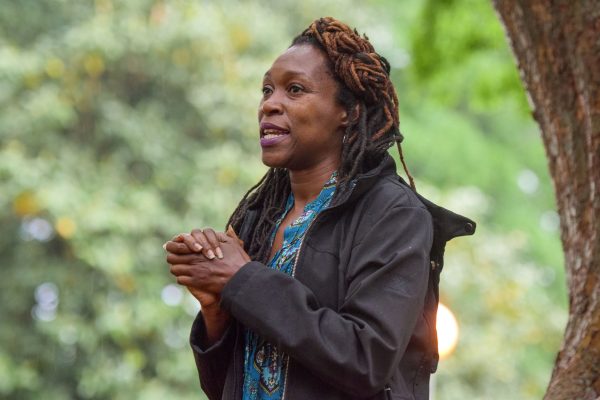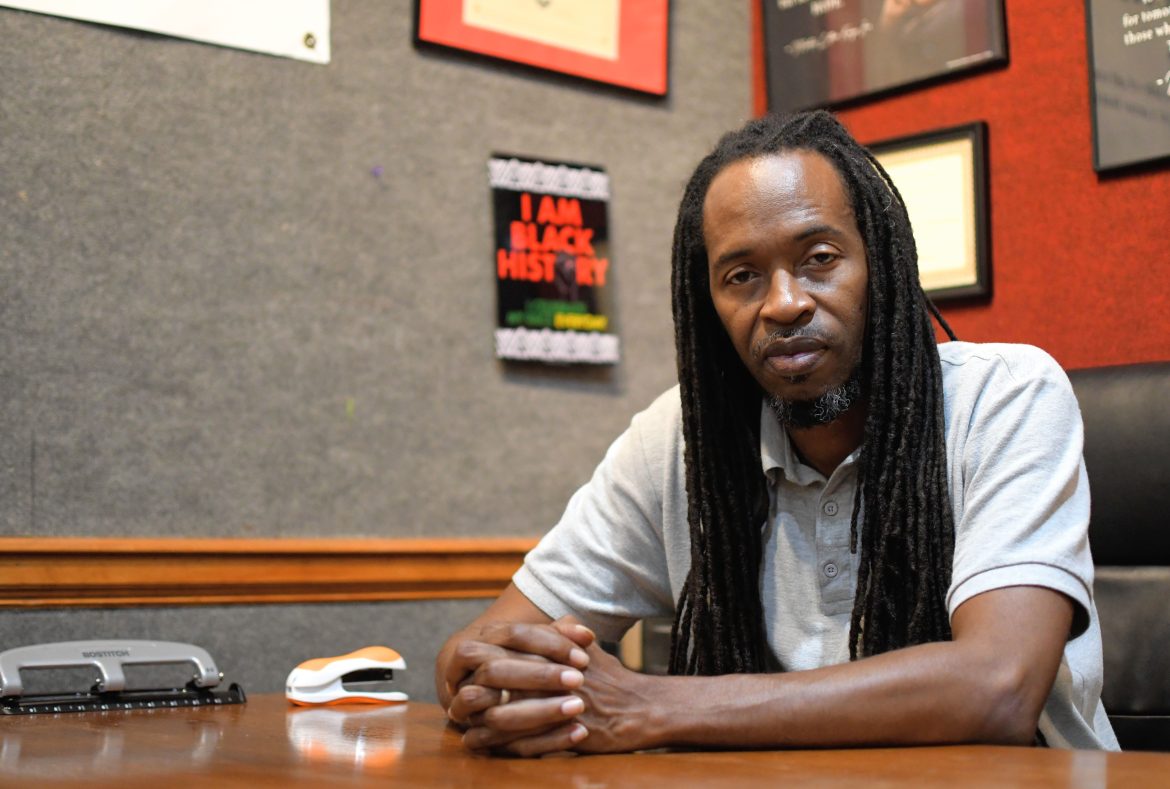Knowa Johnson, co-founder, board member, and Vice President of Marketing, sits at a desk in the Athens Anti-Discrimination Movement pop-up in the Georgia Square Mall on Sept. 1. Johnson has worked to boost the movement, and has seen results firsthand. “We have a lot more help (from volunteers) than (we did) in the beginning,” Johnson said. “It speaks to what our movement is about— bringing people together. (We’re) trying to focus and highlight the likenesses we have, rather than the differences.” Photo by Aza Khan
The Athens Anti-Discrimination Movement was created as a means to elevate minority voices in 2015 and has since then become a staple in the Athens community.
When asked about what led to her initial decision to start the Athens Anti-Discrimination Movement, Mokah Johnson, co-founder and president, remembered a time when she— along with many other members of the community— felt unwelcome in Downtown Athens.
Mokah noticed the discrimination present Downtown in 2015 after a bar formerly dubbed General Beauregard’s named their drink after a racial slur.
“This incident was an opportunity to show the community and the local government that there (was) discrimination happening. There (were) things happening Downtown that (were) preventing other folks from enjoying the community the same way (as others),” Mokah said. “I didn’t see where the mayor and commission did anything about it. The police department didn’t do anything about it. So, we decided to host our first rally and protest.”
After the success of the rally, the AADM decided that they would host an annual Martin Luther King Jr. parade. However, they didn’t stop there, and began to conduct several other events within the community and advocate for policy changes.

Mokah Johnson, co-founder and president of the Athens Anti-Discrimination Movement, stands outside University of Georgia’s Baldwin Hall during the Athens Day of Jubilee on May 4th, 2021. Johnson had the idea to found the organization after a bar named their drink after a racial slur, which exposed some of the more covert racism present in Downtown Athens. “We felt, I would say, not as welcome (as others) Downtown trying to do business as Black business owners. Every time we tried to do different types of events or activities, the locals that were African American, they have all kinds of stories and reasons why they don’t go Downtown,” Johnson said. “I kind of wanted to move at the time because I was like, ‘Where do we live? What is this?’ And we were having a hard time establishing ourselves as entrepreneurs, but we decided to stay.” Photo by Luna Reichert
“Our organization provides that on-the-ground support,” Denise Sunta, AADM Programs Manager and Administrative Assistant said. “So, helping people file discrimination complaints, paying bail (and) mentoring youth who are in the criminal justice system. We also advocate for larger policy change. We’re actually trying to change the way that the systems work and try to reimagine them in ways that are more productive for our community and just better for our community (in general).”
One person who has been on the receiving end of that support, in particular, is Chaplain Cole Knapper, leader of AADM’s Teach the Truth workshop and community member who was born and raised in Athens.
“I first heard about the Athens Anti-Discrimination Movement and Mokah Johnson, in particular, because they were highlighted in an HBO Vice documentary back in 2018,” Cole Knapper said. “I realized that this woman was doing all of this really great (and) really important work in my hometown. I was like, ‘Oh, my God. I’ve got to find out more about her.’ And then, I found out more about the organization, and it was great.”
According to Sunta, a lot of work goes into ensuring that the organization remains up and running, but at the end of the day, the most essential component is teamwork.
“It (takes) a lot of communication, a lot of back and forth, and a lot of research,” Sunta said. “Mokah and I work really well as a team. That’s probably the most important aspect of AADM, being able to work as a team in a way that prioritizes the issues (at hand) but also keeps in mind your own mental health and mental well-being.”
The movement also emphasizes the importance of the community coming together in order to celebrate their differences.
“We have a lot more help (from volunteers) than (we did) in the beginning,” Knowa Johnson, AADM co-founder, board member and Vice President of Marketing, said. “It speaks to what our movement is about— bringing people together. (We’re) trying to focus and highlight the likenesses we have, rather than the differences.”
Since the movement’s founding in 2015, Mokah believes that they have made a big impact— not only on those to whom they have provided relief— but on the community itself.
“I think we have definitely increased awareness around racial issues, racial injustices and kind of planted a seed of wokeness,” Mokah said. “Before, when I used to go to the mayor and commission meetings, there was no one there. There was no one there that was going up to the podium and speaking. Now, it’s amazing, all the different people that come up because now they understand how to use their voice and where to use it.”
“I think we have definitely increased awareness around racial issues, racial injustices and kind of planted a seed of wokeness. Before, when I used to go to the mayor and commission meetings, there was no one there. There was no one there that was going up to the podium and speaking. Now, it’s amazing, all the different people that come up because now they understand how to use their voice and where to use it.”
— Mokah Johnson,
co-founder and president of the Athens Anti-Discrimination Movement
Staff members, such as Sunta, who works with incarcerated people, have been impacted by their everyday duties.
“I think having had that experience of working with (incarcerated people) and then working with these kids who are at risk of entering the criminal justice system, and seeing the ways that they flourish (by) going through our mentorship process, engaging in the workshops that we have (and) connecting with each other and with the mentors— that to me is one of the most rewarding things,” Sunta said.
Cole Knapper believes that the movement is important and has provided her with an opportunity to give back to the community.
“You can help make a difference in people’s lives. It’s not something that happens overnight. It’s something that takes work. It takes building better communities,” Cole Knapper said. “If (the) AADM didn’t exist, I wouldn’t have the opportunity to volunteer to help change these things. That’s how it’s changed me— by giving me the opportunity to give back (to the community).”
